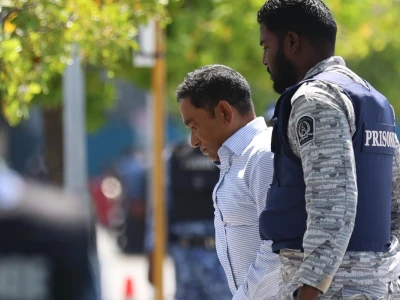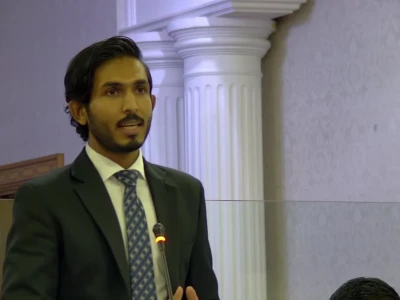
Supreme Court accepts case on Yameen's new evidence
The prosecution said the lower court's procedure for admitting the evidence can be amended when the case is re-examined.
Top Stories
By
Fathmath Ahmed Shareef
The Supreme Court has accepted a petition seeking to overturn the High Court's order not to accept new evidence against former President Abdulla Yameen Abdul Gayoom in connection with the Vaavu atoll Aarah graft case.
The High Court on April 18 quashed the 11-year sentence handed down to Yameen and ordered the Criminal Court to reconsider the case.
The High Court judgement set out the factors to be taken into consideration when the lower court reviews the case. One of them is:
-
The new evidence submitted by the prosecution was admitted in violation of procedure and hence the evidence should be set aside when a decision is taken in the case
The Prosecutor General's Office (PG) filed a petition in the Supreme Court on 24th last month seeking quashing the High Court's order to exclude the new evidence.
The registry of cases filed with the Supreme Court shows that the case has now been accepted.
The Supreme Court accepted the case after the Criminal Court set aside the 11-year sentence handed down to Yameen and ordered a re-investigation into the case and decided to resume the trial on Wednesday.
The new evidence, which the High Court has ordered aside, is the state's attempt to negate evidence submitted by Yameen to prove that the money deposited in his account was a money exchange transaction.
In its plea to the Supreme Court to overturn the High Court's direction to set aside the evidence on the ground that the lower court judge had accepted the evidence incorrectly, the PG office said that the High Court's direction was contrary to the earlier decisions of the apex court.
The prosecution said the lower court's procedure for admitting the evidence can be amended when the case is re-examined.
The prosecution asked the Supreme Court:
-
In connection with the evidence submitted under Article 135 of the Criminal Procedure Code, the defence shall too be given an opportunity to submit any submission
-
Allow both parties to argue the evidence at trial
-
Direct the lower court to decide again on the admissibility of the evidence
Yameen's bribery and money laundering conviction was overturned by the High Court on the grounds that the lower court had committed errors in the overall evaluation of the evidence.
The High Court ordered the Criminal Court to set aside the new evidence against Yameen and to take into consideration the following:
-
Give the opportunity to file pre-trial motions and decide accordingly
-
The lower court judge ruled that Yameen had taken money from MMPRC funds, based on the word of then Vice President Ahmed Adeeb, who was convicted in the case. High Court instructs to set the ruling aside when re-examining the case
-
To evaluate the evidence individually when reconsidering the case
The judgement also noted that there was a clear procedural flaw in the trial and there was potential to change the way the evidence has been examined.




